#New English Translation BIble
Explore tagged Tumblr posts
Text

Seek the Lord and Live
4 The Lord says this to the family of Israel:
“Seek me so you can live! 5 Do not seek Bethel. Do not visit Gilgal. Do not journey down to Beer Sheba. For the people of Gilgal will certainly be carried into exile, and Bethel will become a place where disaster abounds.” — Amos 5:4-5 | New English Translation (NET Bible) NET Bible® copyright ©1996-2017 by Biblical Studies Press, L.L.C. All rights reserved Cross References: Genesis 21:31; 1 Samuel 7:16; 1 Samuel 8:2; 1 Kings 12:28; Deuteronomy 4:29; Deuteronomy 32:46-47; Isaiah 31:1; Jeremiah 29:13; Amos 3:14
Read full chapter
What does God mean when He says, “Seek me and live?”
#seek#seeking#Lord#journey#life#Israel#captivity#Amos 5:4-5#Book of Amos#Old Testament#NET Bible#New English Translation Bible#Biblical Studies Press L.L.C.
13 notes
·
View notes
Text


-Happy Easter..💛
#hi! so.... I'm going to say something different today. just so you don't ““insult”” me and say that I say the same thing every year!/j#for those who don't know. both the bunny and the chocolate egg have a true and also christian meaning!#being that of the egg: “eggs symbolize rebirth and renewal. which makes them perfect for celebrating the story of jesus’ resurrection.”#and the bunny: “the animal was associated with easter because it reproduces quickly and symbolizes fertility and new life.”#(I took this two from a google search. being it in the PORTUGUESE version. so I just translated it.#if you want to look for it in real english. look for it!)#so... it's okay if you want to give someone a chocolate egg or something like that. give a stuffed bunny to a child or someone too.#because there's really no problem#not only because of the real meaning. but there is no reason not to give as a gift something that is also special for that day.#and it's also cute gifts!#just.. DON'T MAKE IT A “SORRY EXCUSE” TO NOT CELEBRATE WHAT THE HOLIDAY REALLY IS!#which is the resurrection of christ! who died on the cross for all of us. ok!?#and yeah.. well. I'm leaving! I hope you have a great day and a blessed easter!! love you all!💛#happy easter#easter#easter art#i'm mel and this is my blog✌️#my art blog#art#my art#my art <3#art mel#my art style#my oc character#mel creator#resurrection of jesus#resurrection of christ#bible verse
26 notes
·
View notes
Text
Anyway, tune in next time on my lettuce fuelled mental breakdown when I explain that, no, the Latin translation of the Kahun fragment is wrong again, and Horus (probably*) did not bring Set back to his house with him and then explain why he was there to his mother by saying: “What shall I do? Set came to sodomize me."
*The thing about him explaining the situation that way is definitely wrong, he used a euphemism instead. The thing about Set going back to his house with him is unclear (there’s a big hole in that part of the papyrus, the plural pronoun that the latin translation seemed to assign to a verb was actually attached to a noun instead, there’s some other stuff going on in the original that might make it safer to assume he went alone or that might not, etc.)
#ancient egypt stuff#Ava has thoughts#What I’m curious about with this is what exactly lead Francis Llewellyn Griffith to translate that line the way he did#with ‘twice beautiful’ it was a lot more clear where the translation wackiness came in but here it is less so#Because interestingly the euphemism Horus uses in the original fragment was also used as euphemism for sex in the Torah#And because it was in the Bible I believe it is now coming back into fashion#So in the modern day it would be possible to translate what Horus said literally and people would still get it#But this translation is over 100 years old so they couldn’t do that because the euphemism wouldn’t be understood by the public#But that does not explain to me why he specifically chose to use paedicatum#Like maybe he thought that the word wasn’t a euphemism and was a new word they hadn’t found before that specified that type of sex?#But the euphemism word is a very common verb just with a different determinative at the end#I don’t know much about Latin so maybe specifying something like that just sounds more natural in Latin#But in English. Oh boy.#Heru#Aset#Sutekh#the latin incident
10 notes
·
View notes
Text
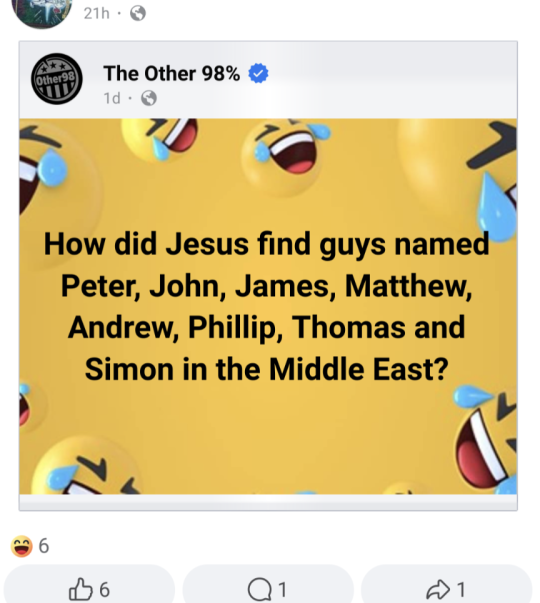
Drunk uncle wait until you hear what they did to the bible before we could read it in modern english
#this is actually so stupid and ahistorical regardless of what you believe it's actually making me kind of mad#like 75% of people in the English translation of the entire bible have recognizable to us names including um. adam and eve#also the stories in the new testament are less than 2000 years old like they literally lived in Rome
0 notes
Text
The English Bible that came from Germany - Reformation Day 2023
When tourists come to the city of Worms in Rhineland-Palatinate, a visit to the so-called "Luther Monument" is of course a "must". But the monument known as the "Luther Monument" is actually not an individual monument to the German reformer from Wittenberg, but a monument to the Reformation and its outstanding personalities per se. In addition to the figure of Luther, the world's largest Reformation monument also features the figures of the Italian Reformers Peter Waldus and Girolamo Savonarola, the English Reformer John Wycliff and the Czech Reformer John Huss.

The "Luther Memorial" ("Reformation Memorial") at the Obermarkt in Worms/Rhineland-Palatine - Picture: Immanuel Giel - Eigenes Werk, Gemeinfrei, https://commons.wikimedia.org/w/index.php?curid=10415428

Forgotten by the creators of the Worms Reformation Monument, however, were two very important figures in the history of the Reformation: the German Pre-Reformer Hans Denk (ca. 1500 - 1527) and the English Reformer William Tyndale (1494 - 1536). The work of these two men, who lived and worked in Worms for a time, would later achieve an international significance similar to that of Luther.
On the occasion of this year's Reformation Day, I would like to shine the spotlight on these two people:
"In Worms, Denck completed his best-known work, which he created together with Ludwig Hätzer: the Worms Prophets, named after the place where the first edition was printed. This is the first printed German translation of the prophetic books of the Old Testament according to the original Hebrew text. It was published on 13 April 1527 by the Worms printer Peter Schöffer the Younger and soon found wide circulation in numerous editions. The translators' motivation and objective were not only theological but also critical of power and society: against the background of the bloody suppression of the peasant uprisings in the Peasants' War and the incipient Anabaptist executions, the polemics of the Old Testament prophets against injustice and abuse of power took on a special topicality." (W) This makes Denk's translation of the Bible, which is unfortunately often forgotten, older than that of Martin Luther.

Title of the first German Translation of the Hebrew Prophets by Haetzer and Denk - Private collection of S. Whitehead, Gemeinfrei, https://commons.wikimedia.org/w/index.php?curid=3048269
The second important figure sadly missing at the Worms Reformation Memorial is William Tyndale (1494 - 1536). Tyndale, an English tutor who had absorbed the teachings of the German Reformation, had to flee England in 1523 to escape persecution by the Roman Catholic Church and first found refuge in Wittenberg. There he translated the New Testament into English. Wittenberg thus became the starting point not only for the German Bible but also for the Bible in English, which later became the world language. This translation was then to be printed in Cologne in 1526. However, these efforts were betrayed and William Tyndale had to flee again. His next place of refuge was the small town of Worms on the Rhine, the place where Luther had delivered his remarkable defence speech before the Imperial Diet only a few years earlier. In this city, which can look back on a long Pre-Reformation history (see Hannes Denk), the New Testament was now also published in English. In the printing press of Peter Schöffer the Younger, 6000 copies of the New Testament were produced in English, which were then first brought across the Rhine to Belgium and from there smuggled to England and Scotland. In the course of persecution by the English government, Tyndal's translation was banned and most of the copies burned. Until now, only two copies were known to have escaped the book burning. It was only a few years ago that a third copy was discovered in the Landesbibliothek Stuttgart (click!).

"The Gospell off Sancte Jhon - The fyrst chapter" - Title of William Tyndales Bible Translation printed in Worms/Rhineland-Palatine by Peter Schöffer (Source: https://commons.wikimedia.org/w/index.php?curid=17912989)
The official Homepage of the City of Worms writes (translation mine):
"Unlike Wyclif, who had already translated the Bible into English about 150 years earlier, Tyndale's New Testament, like Luther's translation, is based on the original Greek text - not the Latin translation of the Church Father Jerome (Vulgate) authorised by the Catholic Church. Moreover, Wyclif did not yet have the printing press at his disposal to distribute his translation.
The Worms edition, like its Antwerp pirate print, was smuggled to England and found wide circulation among the people. The Church, with the support of Henry VIII, who at this time was not yet in conflict with Rome, pursued the possession of this printed edition of the Bible. On 8 May 2009, the City Library received a reproduction of William Tyndale's "New Testament" from a delegation from Worms' twin city St. Albans (Great Britain).
Most copies ended up at the stake in England - as did the translator himself in 1536, who had been imprisoned near Brussels in 1535 on the king's orders.
Only three copies of the New Testament have survived: One fragment is held by the library of St Paul's Cathedral in London, and an (almost) complete one was acquired by the British Library from the holdings of Bristol Baptist College in the late 1990s for over £1 million. The facsimile that was presented to the Worms City Library at the beginning of May 2009 is based on this copy.
Shortly after the spectacular purchase by the British Library, the third copy was rediscovered in the Württemberg State Library, which also includes the title page and is thus the only complete copy that has survived.
Since the printer is not named in the "New Testament", there are only two sure indications of its origin in Peter Schöffer's workshop: In his report to Cardinal Wolsey, Thomas More and Henry VIII about the ban on Tyndale's Bible printing in Cologne, Johannes Cochlaeus mentions that Tyndale had moved on to Worms with a companion. The Stuttgart title page provides another clue: Schöffer used the same woodcut title for two other prints from his workshop.
The location of the printing workshop of Schöffer, who was the first printer to work in Worms for only a few years (1518-1529), was previously unknown. According to the latest research, it can now be regarded as certain: Peter Schöffer the Younger's printing shop, where the New Testament was printed, was located in the Meielburg in the northern suburb at the Mainzer Tor (later location of the Eulenburg; today: location of the DRK Alten- und Pflegeheim / Seniorenzentrum Eulenburg on Mainzer Straße - Eulenburgstraße 2, 67547 Worms)."
#Reformation Day 2023#Martin Luther#Johannes Huss#John Wycliff#William Tyndale#The first English New Testament Translation#Bible Translation#Hans Denk#Pre-Reformation
0 notes
Text
Top 10 Bible Translations (Bestsellers)
Top 10 Bible Translations (Bestsellers) What Is It? The YouTube video Top 10 Bible Translations (Bestsellers) by the YouTube channel Tim Wildsmith: Top 10 Bible Translations (Bestsellers) Description: In this video, I’m breaking down the Top 10 Bible Translations based on sales data compiled by the ECPA based on NPD BookScan. ⬇️ Leave a comment below to let me know what you think, or ask…

View On WordPress
#2022#Bible#Bible Translation#Bible Translations#Christianity#English#New International Reader&039;s Version#NIrV#Tim Wildsmith#Top 10 Bible Translations#Top 10 Bible Translations (Bestsellers)#Translation#Video#YouTube
0 notes
Text
[Dungeon Meshi spoilers]
so in case y’all don’t know what the other characters been doing post-canon, here’s what new details in each character bio which has been added in the complete adventurer’s bible
Side note: I used google translate so NOT all of the information is correct






Hopefully the official English version will be out soon
#my art#dungeon meshi#delicious in dungeon#dunmeshi#laios touden#falin touden#marcille donato#chilchuck tims#senshi of izganda#izutsumi#namari of kahka brud#tansu floke#yarn floke#kiki floke#kaka floke#there’s too many characters help#toshiro nakamoto#shuro#maizuru#benichidori#hien#inutade#kabru#rinsha fana#holm kranom#diamond of sadena#mickbell tomas#kuro#Mithrun of the house of kerensil#pattadol
3K notes
·
View notes
Text
Dungeon Meshi Information Sources
Dungeon Meshi has several worldbuilding details and extra comics in different publications and I think they get pretty hard to keep track of so I wanted to make a guide and explain what is what for people that maybe want to look into it themselves!
The Main Information sources are:
Daydream Hour 2-5: Sketch compilations and extra comics by Ryoko Kui with commentary, which can be found on EH Scans blog translated, and also in mangadex in between the manga chapters (The first daydream hour isn't dungeon meshi related)
The Complete Daydream Hour: Or more specifically "Ryoko Kui Doodle Book Daydream Hour" Released in january 2024 it still hasn't been fully translated into english. This version compiles extras and sketches from daydream hour 1-5 along with new content. Some of the exclusive comics have been translated and can be found on reddit and bato.to but the full thing is yet to be translated. (Update: Daydream Hour is gonna be realeased in english at the end of May 2025! You can pre-order on the Yen Press website)
Delicious in Dungeon World Guide: The Adventurer's Bible (2021): A guide by Ryoko Kui that compiles information about the characters, monsters and the world. An official english version is available. It was released in february 2021 and has information pertinent for up to chapter 71 from the manga. It contains extra comics for all the main characters and for all the human/demi human races. The extras that talk about side character's backstories are from this book and the characters section has been translated by EH Scans (Also on mangadex)
Delicious in Dungeon World Guide: Adventurer's Bible Complete Edition (2024): Released in february 2024 and still untranslated, this version of the Adventurer's Bible has information updated for the end of the manga, there's even more extras and lots of comics about post-canon. Some of them are being translated and posted into reddit but I haven't seen them anywhere else. The raw is available on bato.to (edit: Yen Press has announced the new AB but still no dates)
Manga and Ryoko Kui's Blog: Some of it are from the manga itself, like Monster Tidbits and other Harta Magazine Extras (Where dungeon meshi is published) and also from the author's own personal blog. Lots of the drawings in her blog were deleted with the publishing of the complete daydream hour but you can still see what was unpublished using the wayback machine.
Blu-ray: The blurays is where the "what if" extra comics come from, the covers also have original art by Ryoko Kui and some other extra illustrations you can see on this tag.
I hope this helps somehow! It was pretty confusing for myself when I first started looking for more extras after finishing the manga.
The things I post here are all based on one of these and I try to put in the tags what the source is!
#Dungeon Meshi#For referencing#delicious in dungeon#Ryoko Kui#adventurers bible#daydream hour#dungeon meshi reference#I'm not sure how bad sharing direct links on a post would be but if you need links for anything just send me an ask off-anon#I think with the info here you can find most of these online tho
1K notes
·
View notes
Text

The Heart Reflects the Man
As in water the face is reflected as a face, so a person’s heart reflects the person. — Proverbs 27:19 | New English Translation (NET Bible) NET Bible® copyright ©1996-2017 by Biblical Studies Press, L.L.C. All rights reserved Cross References: Proverbs 27:18; Proverbs 27:20
Read full chapter
Proverbs 27:19 in all English translations (for comparison)
#water#reflection#heart#face#man#Proverbs 27:19#Book of Proverbs#Old Testament#NET Bible#New English Translation Bible#Biblical Studies Press L.L.C.
5 notes
·
View notes
Text
Conférence Masterclass 808 (Translation)
I've taken the liberty of translating the conference that took place last year with the writing director of Miraculous (Sébastien Thibaudeau). It was only made public when someone posted a video of the conference a short while ago.
In this conference, Sébastien Thibaudeau will talk about the creation of Miraculous and his work on the series. He is joined by Chloé Paye, a new scriptwriter working on Miraculous season 6.
Sébastien talks a lot and repeats himself a bit, so the summary can be a bit confusing.
I strongly advise you to go and listen to the video if you understand French. There are a lot of details I'm going to leave out, and Sébastien is very funny.

Photo belongs to mlbfanfr on twitter.
Please be respectful in comments or tags. If you want to debate on things related to this conference, please make your own post. I apologize if there are any mistakes, I'm French and I'm not fluent in English.
-12 years ago, Sébastien arrived at Zagtoon, a studio that was just starting out and had yet to produce and broadcast any series. The producer (Jérémy Zag) and Sébastien hit it off and decided to start working together. Zag decides to give Sébastien total freedom over his projects. Sébastien then decides to put the spotlight on scriptwriters, because in this profession they are unfortunately poorly paid and never stay on the same projects.
So they produced a cartoon called Kobushi. A little-known series that did rather well, even if it didn't stay on the "Gulli" channel for long. The scriptwriters and producer were happy with the end result, as it was produced in a very short time.
Jeremy Zag then proposed another project, which he thought was quite good, but which he was unable to sell to broadcasters. At the time, the project was called "Ladybug". No one was interested, as the project was aimed more at an adult audience than a children's audience. Sébastien had to make sure that the project could be broadcast on Disney and TF1.
There was only a "trailer" also called "Ladybug" (but you'll find the video under the title Ladybug PV) animated by Toei animation. At the time, Sébastien had not yet been hired by Zagtoon. It was Jérémy Zag who convinced Toei animation to work with them (no mean feat, since Toei animation doesn't work with anyone).
So Sébastien started working with Thomas Astruc (the man who wrote and created the "Ladybug" project). At first, he didn't want to work on this project because he found it complicated. Thomas wanted to make a series for adults, but at the time, it was very complicated to make a cartoon for adults. What's more, they didn't have enough money to take on such a project. Sébastien finally agreed, but there were some changes to be made, which Thomas accepted.
-What Sébastien appreciated most in this project was the romantic comedy, the love square between the two main characters.
To meet the requirements of the cartoon industry, "Ladybug" had to be set in a neutral universe, in other words, in an imaginary country or the USA, but Zag, who loves Paris, declared that the cartoon had to be set in Paris.
In the end, Thomas Astruc's entire project was discarded, leaving only the love story between the two heroes and the city of Paris, where the story was to take place.
------------------------------------------------------------------------------
-Sébastien explains how he writes Marinette's first dialogues: He says he talks a lot in real life, so he writes Marinette like him. She says out loud whatever she's thinking.
For Chat noir, he makes him tell his father's jokes. Something TF1 doesn't accept. The TV channel went so far as to refuse to validate the Bible (a collection of information on the series and episodes) until it had removed the sentence: “Chat noir makes jokes”. Sebastien has therefore removed the sentence, but will continue to make Chat noir tell jokes.
-The writing director's job is to get the producer, creator and broadcaster to agree. The series broadcast on TF1 and Disney are very different. TF1 wants series whose story can be told in a single episode, unlike Disney, which wants series whose story spans several episodes.
Sébastien and TF1 agree that Miraculous will be a series with one story per episode, a "Formula Show".
He cites the example of Dora the Explorer episodes, where every episode is the same: Dora goes on an adventure from point A to point B, she has to find 3 clues, then she meets Swiper, she sings a song to make Swiper go away, she uses the talking map to get from one place to another, then Dora manages to get to point B and the episode ends.
This episode format is used for children, to give them a reassuring framework, as they build themselves up through repetition. That's why series like Dora work so well with young children.
So Sebastien sold the Miraculous series to broadcasters as a formula show. A person gets angry, is akumatized, then marinette transforms into Ladybug then frees the person from the akumatization and… The End.
It's also for this reason that Marinette tries to confess her love for Adrien in every episode, but is unable to do so.
But he tried to go against what he had planned with TF1, by slipping little extra stories into certain episodes. Audiences were receptive to these slightly hidden stories. The TV channel even asked Sébastien if there really were hidden things in the series, but he denied everything. Thanks to the positive reception from the public, TF1 agreed to develop the characters of Marinette and Adrien and flesh out the universe a little more.
------------------------------------------------------------------------------
-Once the bible is written, they have to write a script. But first Sébastien, as writing director, needs to know the mood of the series, and to do this he calls on Thomas Astruc, the series creator. Thomas is a great fan of classical painting. A single painting can tell a complex scene with lots of detail. He wants the episodes of miraculous to be like these paintings, there will be very few shots, but in a single shot a lot will happen.
-Sébastien explains that one of the things Thomas wanted to convey in the series was emotion. They didn't want to do what a lot of children's cartoons do, which is to beat the bad guys and win at the end of the episode. They wanted to tell kids that it's normal to have negative emotions. We can also become better people, learn from our mistakes and so on. It also reassures TV channels by setting up scenes that are repeated in every episode: people get angry, people akumatize then people deakumatize, end of episode...
Once the TV channels had been reassured, they set about writing a script.
-Sébastien asks Thomas to write the ending, as they're not sure the series will work. They also wondered what the aim of the series was, and what they wanted to say to the children. The two of them sat down in an office and wrote the ending, which turned out to be just the end of an arc. He even adds that now that they've written a lot more, it's important for them to write in advance so that everything is clear to them.
-The first season was written by 19 authors, from home. He found it interesting that the series was written by several different authors, even if some of them didn't quite understand the premise of the series. One episode that Sébastien particularly appreciated was written by two “autrices” (I think it's weird to say “two female authors”, so I'll use the French word): the refletkta episode, with the story of Juleka who couldn't get into the photos. (Note that all the episodes were proofread by Sébastien and Thomas).
After that, they kept a few people on to work together on the scripts for subsequent seasons.
Sébastien explains that he keeps a close eye on the production of the episodes, to make sure that everything that goes into the picture is as faithful as possible to what they've written in the script.
------------------------------------------------------------------------------
-The kwamis exist thanks to Toei, who wanted funny little animals to sell plush toys. So the scriptwriters had to find a way to integrate kwamis into the story.
-(Again, Sébastien advises people to check out the Kobushi series if they can still watch it somewhere, or ask the leaker who leaked the whole of season 5 to give them the episodes (that's a joke, of course)).
-Sébastien talks about the Ikari gozen episode, which could have been a total failure because the storyboarder didn't fully understand the scenario. Sébastien asks Zag to redo the storyboard, which will add 10 weeks to the episode's deadline. The storyboarder admits that he's always done storyboards mechanically, without worrying whether the episode is good or not, whether the jokes are funny or not. Eventually, the episode was redone by the same storyboarder, resulting in the episode we all know today.
- They still have a lot to tell with Miraculous, to the point where they're wondering if they'll have enough seasons to tell everything they want to tell. Sebastien says there will be a season 6 and 7, and probably a season 8 and 9.
------------------------------------------------------------------------------
- Chloé Paye met Sébastien when she was looking for an internship. She had never worked in animation, and knew nothing about Miraculous. She tells us how the scriptwriting team works. Each time, all the scriptwriters in the room have to be convinced of the script. They can sometimes spend hours on details to get everyone to agree.
------------------------------------------------------------------------------
- The driving force behind the series is that there must always be a secret between Marinette and Adrien. The lovesquare can never be broken, otherwise there's no series. Sébastien knows that some people are worried about this. Will they continue the lovesquare for another 4 seasons or more? How will they evolve? Sébastien says not to worry, they know where they want to go.
-It takes them 14 to 16 months to produce an episode, but it's often much longer due to unforeseen circumstances. And they don't work on one episode at a time, but on several at the same time. One episode takes a long time because of the 3D animation.
One of the things that's complicated with Miraculous 3d animation is that they can only display 3 characters at a time on screen, whereas the series requires them to display many more characters. It's also very difficult to correct animation errors, as this takes a lot of time.
-The TV networks were very surprised by the success of miraculous. They didn't think adults and children alike would watch the series. The TV channels were a little confused because they usually make series for a specific age group, but since miraculous had people of all ages watching, they weren't sure what to do.
- Sébastien says he's very happy that miraculous inspires a lot of people to create things, like writing fanfiction, however he's not interested in it because he doesn't want to be influenced by certain fans who would love to see certain things in the series.
- Writing direction also means paying attention to how the characters speak. They all have their own way of speaking. For example, Adrien will never say "j’te parle", but rather "Je te parle".
- During the writing process, the writers sometimes act out scenes to make the dialogue more natural. This is what happened with the episode "Gang of secrets". They felt that, with the success of the show and the pressure it was generating, they needed to write something to relieve their stress. So they wrote about Marinette and the enormous pressure she was under to keep all her secrets. The final scene, in which Marinette tells Alya that she's Ladybug, came naturally when they performed it together.
619 notes
·
View notes
Text
✰NEPTUNE IN ARIES✰
A once in a lifetime astrological event!

©️GeminiMoonMadness
✧・゚:*✧・゚:* ✧・゚: *✧・゚:* ✧・゚: *✧・゚:*
Neptune takes roughly 165 years to transit the whole zodiac and has been happily swimming through his own sign of Pisces since 2011. Neptune will transit Aries from 2025 to 2039, spending about 12 and a half years there in total, with a few dips in and out at either end. This represents the start of a new cycle of inspiration and change.
✧・゚:*✧・゚:* ✧・゚: *✧・゚:* ✧・゚: *✧・゚:*
Here are the dates:
-Enters Aries on 30 March 2025
-Retrogrades into Pisces on 22 October 2025
-Re-enters Aries to stay from 26 January 2026
-Dips into Taurus on 21 May 2038
-Final visit to Aries from 21 October 2038
-Enters Taurus to stay on 23 March 2039
✧・゚: *✧・゚:* ✧・゚: *✧・゚:* ✧・゚: *✧・゚:*
Neptune was last in Aries from 1861 to 1875 and brought to light humanity´s impulsiveness translated into wars, the creativity to invent and the determination to discover.
As Neptune transits the signs, it reveals what we idealise and look to for redemption or salvation. In Capricorn (1984-1998) it fed the idealisation of corporations and big business and in Aquarius (1998-2012) it idealised science and technology. In Pisces (2011-2025), it appears to be idealising deception itself because we’re all drowning in fake news and propaganda in a crazy-making post-truth hall of mirrors.
✧・゚: *✧・゚:* ✧・゚: *✧・゚:* ✧・゚: *✧・゚:*
WHAT HAPPENED IN HISTORY THE LAST TIME NEPTUNE WAS IN ARIES?
60 – 73 CE
-In Rome Christianity was spreading fast
-In Palestine there was a Jewish uprising against the Romans in 66 and Josephus wrote his history of the Jewish War which became a major source on Jesus.
388 – 401
-Christianity had become the official imperial religion of the Roman Empire in 391
-Theodosius prohibited all pagan cults and worship.
432 – 419 BCE
-The ancient Greek city states were always having falling outs/battling.
-The Peloponnesian War between Athens and Sparta began and ran for decades.
879-892
-Alfred the Great created a small fleet of ships to fight naval battles against the Vikings.
1206 – 1219
-Genghis Khan began his conquest of Eurasia
-The Christian Crusades were in full swing
1370 – 1383
-The Hundred Years War between England and France was going strong, it started in 1337 and ended in 1453.
-The Catholic Church split in 1378 and there were two rival popes until 1417
-The Church came under attack from 1377 by John Wycliffe, an English theologian.
-John Wycliffe (as above) completed the first translation of the Bible into English in 1382.
-1370s, the story of Robin Hood began to circulate (a tale of a classic Aries character).
1534-1547
-Henry VIII broke from Rome and declared himself supreme head of the Church of England
-This led to the dissolution of the monasteries in 1536 and the destruction of religious relics and churches, and endless fighting between Catholics and Protestants.
-In the 1540s Valerius Cordus wrote Dispensatorium, the first pharmacopeia covering medicinal plants, minerals and how to make drugs, published in 1546. He also discovered ether in 1540, which was used in pain relief for surgery – and for getting as high as a kite!
1697 – 1711
- Lots of fighting and rebellions in Europe over various things, including the War of Spanish Succession in which England took Gibraltar in 1704.
-England was getting tired of fighting the Scots, and in 1707 the Act of Union formed a new entity called Great Britain, unifying England and Scotland.
1861-1874
- American civil war commenced
- germ theory was invented
-Violence on the Australian goldfields
-Slavery
-Abraham Lincoln becomes president
-Franco-Prussian War
(Can you notice a trend?)
✧・゚: *✧・゚:* ✧・゚: *✧・゚:* ✧・゚: *✧・゚:*
PREDICTION FOR 2025-2039:
Neptune in Aries could bring pioneering visions that reach into every part of society, with lots of new ideas and progressive thinking. There could be idealistic revolutions and social activism, visionary rebellions, crusades for truth and religious wars. Wars may be fought based on lies and deception (nothing new there then), or fought with bioweapons, chemicals and viruses.
At best, Neptune could inspire compassionate action and leadership that takes us away from the potential for war. But it could just as easily reveal the corruption and weakness of leaders that create power vacuums and trigger war by accident.
There may also be a massive loss of faith in leadership, a loss of belief in the nation or the system. People could turn away from the system out of disillusionment or even boredom, and lose themselves in escapist pursuits, like gaming or virtual reality.
✧・゚: *✧・゚:* ✧・゚: *✧・゚:* ✧・゚: *✧・゚:*
WHAT HOUSE IS YOUR NEPTUNE IN?
WHAT HOUSE IS YOUR ARIES IN?
WHAT DEGREE IS YOUR NEPTUNE?
✧・゚: *✧・゚:* ✧・゚: *✧・゚:* ✧・゚: *✧・゚:*
#Neptune#astrology advice#astrology#astrology observations#astro community#astrology community#astro posts#astro#astrology readings#astrology posts#astro observations#astro transit#transit astrology#Neptune in Aries#Aries#Neptune transit#Astro readings#history#astrology history#astrology predictions#Aries transit#outer planet#astrology transit#astrology event#astrologist#astrology aspects#astrologer#astrology page#Aries history
186 notes
·
View notes
Text
all the symbolism of sunday i gathered before his release as a playable character.
while reading this, keep in mind that this may not be the same as his new character design. thank you for reading and enjoy!! point out mistakes, or anything i missed in the comments!! ♡♡ i'll probably make a separate post for his new design as well someday.

the thorny vine patterns on his clothes: Jesus is called "the true vine" of God, but he was also given a crown of thorns when he was crucified.
thorns (we can see them on sunday's design) were created as a punishment for the first sin.

there are eyes placed throughout his design, which are associated with the ophanim, an angel made up of wheels and eyes throughout its surface.
sunday has 3 pairs of wings in his concept art, and one pair is covering his eyes. this could be associated with seraphim—a creature close to god who also has 6 wings.

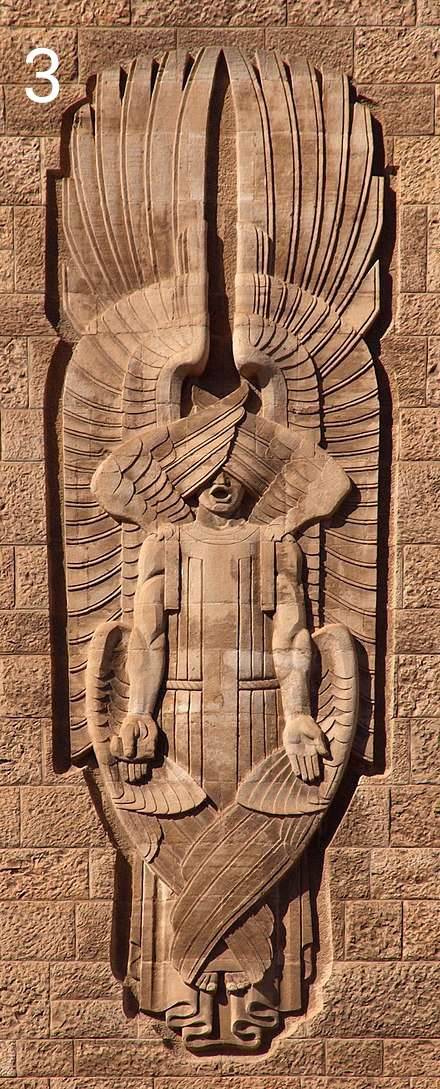
sunday's concept design also seems to have a seraph design near his collar.

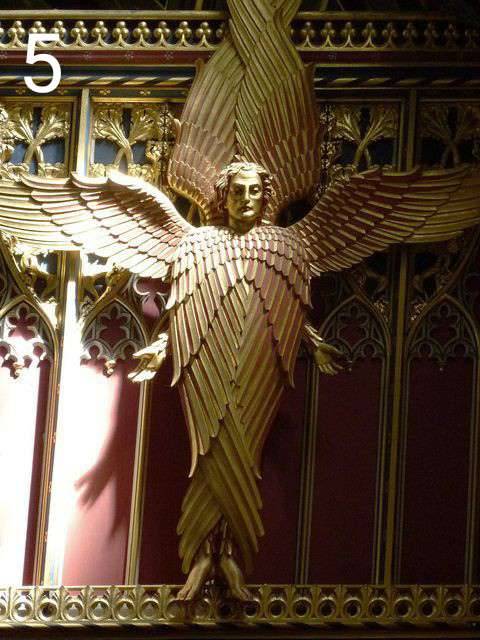
the word serpah literally means destruction by fire in hebrew. upon hearing isiah's confession, one of the serpahim removed a coal from the altar of god and touches isiah's lips with it, saying "see, this has touched your lips; your guilt is taken away and your sin atoned for."
seraphim cover their eyes to avoid looking at god and be blinded by His light, and also feeling ashamed to be in His presence, demonstrating their humility. seraphim are the closest angels to god. They focus on praising and worshiping god for who He is and what He does—which could also be said for sunday and the 'odes of harmony'. (the odes of harmony are based off of the bible.)
sunday's halo is a buddhist wheel. i can not stress this enough, because it represents all of sunday's views: right (or wise) view, intention, speech, action, livelihood, effort, mindfulness, and concentration. all of these views can be observed whenever sunday speaks.

the cross on sunday's hand (starting from wrist) could be representing jesus' wrist when his hand was nailed to the cross. this may be a bit of a stretch but i'll put it here anyways.
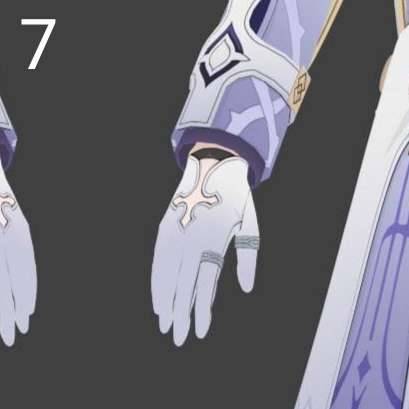
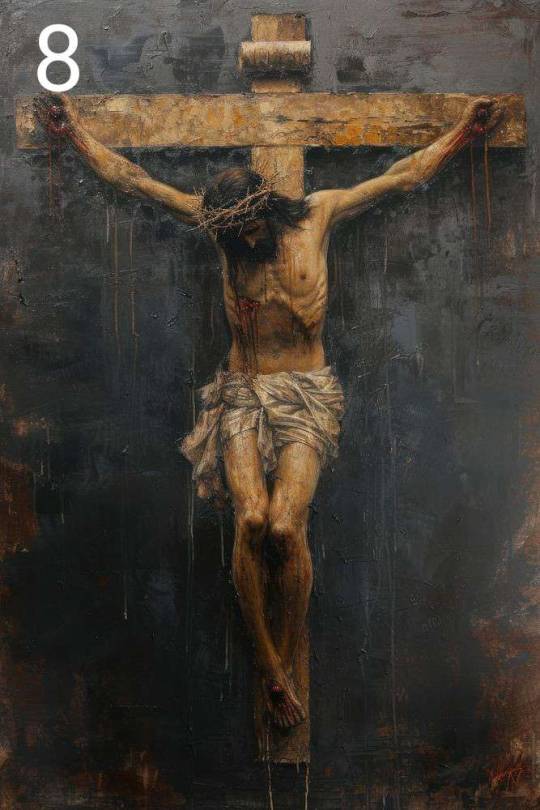
sunday is also wearing rings on his index finger and thumb. these fingers are usually used to cross oneself. they also represent people of a specific family who have a high authority.
sunday's name can be derived from dies solis (in old english), meaning the day of the sun.
the sunday boss name is dominicus, comes from dies dominicus, which also means the Lord's day (sunday).
when sunday calls upon Ena, it's called "im Anfang war die Tat." it is a German phrase that translates to "In the beginning was the deed." this means that action or deeds came before words, thoughts, or anything else. it emphasizes the importance of actions over other elements like ideas or speech. the phrase originates from Johann Wolfgang von Goethe's play "Faust." specifically, it appears where Faust is translating the Bible and changes the opening line of the Gospel of John ("In the beginning was the Word") to emphasize action over mere words.
#sunday#honkai star rail#hsr#sunday hsr#sunday symbolism#robin#robin hsr#sunday honkai star rail#sunday x reader
57 notes
·
View notes
Text
Idioms in Catalan with a religious origin
There's quite a lot of idioms that we say in everyday life, outside of the context of religion, but that come from religious stories or events.
Most of them come from Christianity, and many of them are shared with other Romance languages or other languages from historically Christian countries. To keep this list accessible to everyone regardless of cultural background, I will include the literal translation to English and also an explanation all of them.
Let's see how many of these you can understand before seeing the explanation. Let us know in the tags!
1. Fer Pasqua abans de Rams = "to do Easter before Palm Sunday", meaning to get pregnant, have a baby, or to have sex before getting married. Nowadays it's used in a more general sense to mean to do something before it's time (like English "put the cart before the horse"). Palm Sunday is a holiday celebrated the week before Easter.
2. Per a més inri = "for more INRI", used to add a bad thing on top of something else, making a situation even worse or more humiliating. It's a reference to the sign that said "INRI" (stands for the initials of "Jesus of Nazareth King of the Jews" in Latin) that Roman soldiers hanged on Christ's crucifix to make fun of him.
3. A la babalà = "in the babalà way", meaning to do something without having thought much about it. But what does "babalà" mean? This word doesn't exist in the Catalan language outside of this expression. It comes from the Arabic Alà bâb Allâh which means "in God's hands".
4. On Crist va perdre l'espardenya = "where Christ lost his sandal", or on Crist va perdre el barret = "where Christ lost his hat", meaning somewhere very far away and usually in the middle of nothing. I don't know of any story that has Christ lose his sandal or hat.
5. Perdut de la mà de Déu = "lost by God's hand", meaning a place in the middle of nowhere.
6. Ser un calvari ="to be a calvary", meaning that something is a cause of suffering. You can also hear quin calvari! = "what a calvary!". This is a reference to Mount Calvary, where Christ was crucified.
7. Endavant les atxes = "ahead with the candles!", meaning "keep going!", used to encourage to keep going in a negative situation with difficulties or a situation that you would have preferred to avoid. An atxa is a kind of big candle that the first people in a religious procession carry. This was the shout that would start a procession.
(Note: in recent years, Spanish media has used this idiom as supposed proof that Catalan independentists who said it are calling for violence, using a fake translation that assumed that "atxa" must mean the same as Spanish "hacha", meaning "axe" 🪓, because the pronunciation is almost identical. This is false, when people were saying "endavant les atxes" they did not intend any meaning related to "bring the axes". This was used to justify violence against Catalan activists, but has no ground in reality. "Axe"🪓 in Catalan would be "destral".)
8. Net com una patena = "as clean as a paten", meaning very clean. A paten is a kind of small dish used in Catholic mass, where the blessed sacramental bread in placed on.
9. Acabar com el rosari de l'aurora = "to end up like the dawn rosary", meaning to end very, very badly, usually in violence. The dawn rosary used to be a procession that was done in the early morning of certain holidays while praying the rosary. The idiom (which also exists in Spanish) comes from the year 1868. Around those years, there were many anticlerical riots, while the Catholic church kept doing the dawn rosary on the streets and often assigning it political meaning. In Barcelona and other cities, anticlerical protestors tried to stop the dawn rosary from happening, and it ended in violence and blood.
10. Plorar com una Magdalena = "to cry like a Magdalene", meaning to cry a lot and very desperately. This is a reference to Mary Magdalene, a character from the Bible's New Testament who cried when she met Christ.
11. Déu-n'hi-do! = "God gives!". This expression is difficult to translate because I don't think English has an equivalent (the closest I can think of are "wow!" or even "holy shit!"), but Catalan people use it a lot. It's an exclamation used to show surprise, awe or to mean a big quantity.
12. Ser més vell que Matusalem = "to be older than Methuselah", meaning that someone is very very old. Methuselah is a character from the Bible's Old Testament who is said to have lived for 969 years. This comparison is used for comedic value.
13. Rentar-se'n les mans = "to wash one's hands", meaning to say you're not responsible for what happens. This is a quote from the Bible's New Testament: when Christ is being judged by Pontius Pilate, the crowd is asking him to sentence him to crucifixion. He asks Christ to defend himself, but he doesn't. Pilate doesn't want to sentence him to death, but he sees he has no other option. Then, he sees his hands are stained with Christ's blood, and washes his hands as he decides that this situation will not be his responsibility.
14. Arribar a misses dites = "to arrive to mass [already] said", meaning to arrive late when something has already happened.
15. Ser com les palmes d’Elx, que vingueren el matí de Pasqua = "to be like the Elx palms, that arrived on Easter morning", this is used in the Valencian Country to mean to be late. Elx is a city with the biggest palm groove in Europe ever since the Middle Ages, and many of these palm tree leafs are used for making the palms used for Palm Sunday, the celebration that happens a week before Easter.
16. Va a missa = "goes to mass", meaning whatever is said is exactly what will happen, without complaining or second thoughts.
17. Endiumenjar-se = "to Sunday yourself" or "to Sunday up", meaning to dress up in your best clothes (same as "to wear your Sunday best" in English). Traditionally, people used to wear their best clothes for Sunday mass.
18. Alt com un sant Pau = "as tall as a saint Paul", someone who is very tall. Saint Paul was not tall, in his texts he describes himself as a "little man". The origin of this sentence is in Catalonia centuries ago. People used to celebrate the holiday of Saint Paul's Conversion (January 25th). In the Sant Pau del Camp church area in Barcelona, the tradition for this day had a man yield a huge sword. For this reason, the man had to be tall and strong.
19. Alegre/content com unes pasqües = "as cheerful/happy as Easters", meaning to be very happy and cheerful.
20. Discutir sobre el sexe dels àngels or parlar del sexe dels àngels = "to argue about angels' sex", meaning to endlessly argue heatedly about something insignificant where neither side will ever convince the other to change their minds. Also called una discussió bizantina="a Byzantine argument". This comes from the historical fact that Biblical scholars spent centuries arguing on whether angels can be male or female or not. Legends say that, when the Ottomans were laying siege on Constantinople in 1453 and getting ready to invade it, the Byzantine theologists were arguing about whether angels have sexes instead of doing anything useful.
21. Pagant, sant Pere canta = "if you pay, saint Peter sings". The person who hears it, might answer i sant Joan fa esclops = "and Saint John makes clogs". This means that money will get you anything, even the things that seemed impossible. It might be a reference to the Bible story where saint Peter was asked if he knew Christ after he was taken to crucify, and Peter lied three times and said he didn't know him. "To sing" in Catalan can also mean "to confess". Maybe, if they had paid him he would have confessed.
22. Perdre l'oremus = "to lose the oremus", meaning to lose control of yourself, or to get disoriented or lose memory. "Oremus" (which means "let's pray" in Latin) is the sentence that Catholic priests say during mass to lead a prayer. It's believed that this idiom comes from some incidents where a priest would start the sentence "oremus..." but then couldn't find the prayer he wanted to lead, which he might have misplaced somewhere else in his book. So he would say "oremus... uh... oremus..." while flipping the pages looking for the right one.
23. A bon sant t'encomanes! = "You entrust yourself to a good saint!", said with irony. It's said when you ask for help or rely on someone who is not competent.
24. Ser més papista que el Papa = "To be more Popeist than the Pope", meaning someone who is too dogmatic, too strict or extremist in following the rules, or who believes in or defends something in a more extreme way than the people most affected by it.
25. Qui no coneix Déu, a qualsevol sant li resa = "He who doesn't know God, prays to any saint", used to compare something very good to something worse that someone else likes, usually something worse but that is very popular.
And there's probably others that I forgot.
How many of these are shared with your language?
#llengua catalana#religió#languages#català#catalan#coses de la terra#religions#catholicism#language learning#langblr#polyglot#language#romance languages#cultures#culture
150 notes
·
View notes
Text
My Utena Fansub Ep 2 (and Ep 1 rerelease)
Here's episode 2! A huge thank you to @dontbe-lasanya for their incredible efforts at editing my translation!
Also, episode 1 has been revised. I'll update the link on my original posts, but if you're looking at a reblog it will still have the old link. From now on, I'll be posting a link to a folder with all the episodes after each release, so you can easily find old episodes. You can find the new ep 1 and all other episodes as they release here:
Translation Discussion
Utena uses boku. There’s no way to convey this aspect of self-identified masculinity in english, so the translation needs to make up for it in other ways. One way I did this was the “Master” translation of 様 (sama), but this isn’t self-identified (in fact, Utena dislikes the use of 様). I saw a good opportunity to do this here:
まあ、一人部屋らしいから、クールな僕の趣味には合ってるよ。
I think I’ve got a room to myself. Kinda perfect for my bachelor lifestyle. (my translation)
I'm gonna have to be on the lookout in the future for other opportunities for Utena to gender themself masc!
-----
世界の殻を破壊せ... 世界を革命するために!
Destroy the shell... and revolutionise the world!
Other translations often translate this as "For the revolution of the world!" or "For the sake of revolutionizing the world!". I believe these translations are trying too hard to make explicit the function of ために to express purpose/aim. I think it's unnecessary - a simple "and" will do, because the fact that "revolutionising the world" is the point of "destroying the shell" is wholly self-evident through context.
-----
I didn’t have space to talk about the A-ko/B-ko translation or Zettai Unmei Mokushiroku in the first post, but there were some interesting decisions to be made!
かしらかしら、ご存じかしら?
My oh my, haven’t you heard? (my translation)
This was in important translation because it gets used so many more times in the show, and it needs to make sense in many different contexts. The shadow girls tend to echo their opening lines in their closing lines:
でも、勇者様、わざと負ける難しさをご存じかしら? かしらかしら、ご存じかしら?
but, sir knight, haven’t you heard how hard it is to lose a fight on purpose? My oh my, haven’t you heard? (my translation)
The opening line needs to be able to be recontextualised from a relatively innocent phrase that signifies the shadow girls are gossiping, to a more sinister taunting of “the knight” for being naive (or, in the first episode, not knowing what they’re getting into).
I went with “my, oh my” for かしらかしら because it sounds a bit old fashioned and feminine, just like the Japanese. I originally had “have you heard?” but it didn’t sound nearly taunting enough when repeated in he closing lines.
-----
絶対運命黙示録
Certain destiny: the Revelation! (my translation)
Most existing translations have this as “Absolute Destiny: Apocalypse” or “Absolute Destiny: Revelation”.
黙示録 is the word for the Book of Revelation, from the Bible. It’s not just describing any apocalypse, but the Biblical, Christian Revelation. I think “apocalypse” has become more generic in modern English, whereas “Revelation” is decidedly Biblical. This also influenced some of the decisions to jazz up the rest of the song to emphasise the Biblical references.
The word 絶対 can means “absolute” as in “without question”, but “absolute” has other meanings besides this in modern English (e.g. “extreme”). I decided to go with “certain” because I believe the original Japanese is trying to get across the unquestionable destiny of the Revelation: “It’s absolutely going to happen”. Also, maybe I’m too online but I think “absolute” just sounds silly here. Online vernacular has made “absolute” an almost jokey word (e.g. “absolute unit”).
However, I did include the classic name of the song as the lyric at the end of the song before it goes into the syllable switching chant:
絶対運命黙示闇
Absolute destiny: Apocalypse!
Note the slight difference here in the japanese. 闇 means darkness, and 黙示闇 isn't a real word, it's just a combination of "Revelation" and "darkness". The last kanji in the more common 黙示録 means "record" as in "the records of the Revelation", the Book of Revelation. While the meaning doesn't change much with the substitution of 闇, it makes the line feel a bit darker, a bit edgier, which made it feel appropriate to include the edgier classic name of the song here.
出生登録、洗礼名簿、死亡登録
Records of childbirth, records of baptism, records of death. (my translation)
Other translations have this as “birth records” and “baptismal registry”, which I think sound awkward. “Birth records” has too few syllables for the line of the song, and doesn’t sound poetical enough, while “baptismal registry” reeks of someone looking up the word in a dictionary and plopping it in without thinking about how it would sound in a haunting apocalyptic song.
もくし くしも しもく くもし もしく しくも
Revelation, Apocalypse Apocalypse, Revelation
The syllable switching chant is impossible to translate - doing such a thing in English just makes it sound silly. Since this line comes directly after the switch up with the original song name, I decided to use the synonyms Revelation and Apocalypse in an alternating sequence to give the same impression of a haunting, cult-like chant. I think this alone makes the decision to use the original song name worth it! Really happy with how the song has turned out.
#utena#rgu#revolutionary girl utena#sku#shoujo kakumei utena#utena fansub#official blog post#translation#japanese#japanese language#langblr#learning japanese
69 notes
·
View notes
Note
say, I was wondering if you'd know where everyone is reading the new complete adventurer's bible in english? the one with the extra info and the lil senshi diary and stuff. no worries if not, thanks for your time!
I will not share any links or names of websites because thats how they get taken down.
but only the first publication of the adventurers bible will be on those sites in english. the complete version was only released a month or two ago, and so it’ll be a while before it’s officially translated. Most of the new comics have been fan translated and posted here, on reddit, or other various sites. I don’t think everything has been translated. I haven’t found translations for the timeline yet.
However, senshi’s journal is in the original, but only up to the changelings. the complete version has new stuff in it.
120 notes
·
View notes
Text
Why doesn't the Bible just say, "Jesus is God?"
I've made a series of posts already elaborating the backing for Trinitarian beliefs, and so you may be thinking about how it's actually come up several times that the Bible actually does say Jesus is God on a couple of occasions namely in the confession of Thomas and also of course Jesus's famous statement, "Before Abraham was, I Am."
The question remains though, why does the majority of the Bible typically refer to Jesus by other titles other than "God"?
The answer is, actually, what I consider one of the strongest, if not THE strongest argument for the deity of Christ, so hold on to your hats.
The fact that the Bible doesn't outright say "Jesus is God" except in indirect cases is more reflective of the relative importance and etymology of the word "theos" (translated as "God") than it is of Jesus's identity.
That is because this word is relatively generic.
The writers of the New Testament would have considered the word "Lord" ("Kyrios" in the Greek) as a much more definitive way of tying Jesus's identity to Yahweh, the God of the old Testament.
This is because, in the Septuagint, which is the Greek translation of the Old Testament as quoted by the writers of the New, the word "Yahweh" was rendered, infallibly, in Scripture, as "Kyrios".
(Note: Kyrios translating to English as "Lord" gives rise to the indicator "LORD" in modern English bibles for the name of God.)
Therefore, every time that the New Testament writers use the word "Kyrios" to say "Christ is Lord", they are not merely calling him, "a lord" as someone in the middle ages might perceive it, but calling him God in a much more direct and personally identifying manner than using the term "theos".
Once you have this in mind, the Bible actually says Jesus is God on almost every page of the epistles, because you can hardly turn anywhere without seeing that Jesus is LORD, and it is not shocking why the NT writers found this term more urgent and compelling than Theos, which is already often used many times alongside the divine title anyway, as "The LORD God".
There should be absolutely no need for any confusion here.
355 notes
·
View notes